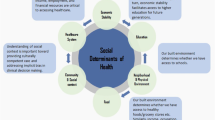Abstract
Objectives
We examined the relationship between absolute income, adequacy of disposable income, and self-rated health among participants aged 60 years and over.
Design
Cross sectional study.
Setting
Community living older people in Hong Kong.
Participants
Older people aged 60 years and over in five districts in Hong Kong.
Measurements
Data from a cross sectional survey of age friendly characteristics across five districts of Hong Kong carried out using stratified random sampling across a broad range of socioeconomic attributes.
Results
Self-rated health showed a gradient for both absolute and adequacy of disposable income. The OR for the association between having just enough, or insufficient disposable income and poor health was higher: 2.0 and 3.6 respectively, and higher than that for absolute income (OR 1.8), and remained significant after adjustment for absolute income. No association between absolute income and self-rated health was observed among women. These findings suggest that adequacy of disposable income provide a stronger association with self-rated health compared with absolute income among older people aged 60 years and over, particularly for women. The absolute income corresponding to what is considered adequate disposable income lies between HK$4000–10000.
Conclusion
Adequacy of disposable income may be a better indicator than absolute income for older people in examining the relationship with health outcomes, particularly for older women.

Similar content being viewed by others
References
Woo J. Indicators of Societal Adaptations to Ageing Well Advances in Geriatric Medicine and Research. 2020;2(1):e200003.
Zaidi A. Global AgeWatch Index 2013: Purpose, Methodology and Results (HelpAge International, London). 2013.
IOA. CUHK Jockey Club Institute of Ageing. Report on AgeWatch Index for Hong Kong 2014 http://www.ioa.cuhk.edu.hk/images/content/Report_AgeWatch2014.pdf. Hong Kong; 2014.
Marmot M, Wilkinson RG. Social Determinants of Health. Marmot M, Wilkinson RG, editors. New York: Oxford University Press; 1999.
Siegrist J, Marmot M. Social Inequalities in Health. New Evidence and Policy Implications. Siegrist J, Marmot M, editors. New York: Oxord University Press; 2006.
Woo J, Leung J, Chan R, Chau PH. Influence of income and self-rated socio-economic position on lifestyle, and physical and psychological function in older Chinese adults aged 65 years and over. Public Health. 2013;127(9):878–81.
Marmot M. The Status Syndrome. USA2005. p. 255.
Yu R, Wong M, Woo J. Perceptions of Neighborhood Environment, Sense of Community, and Self-Rated Health: an Age-Friendly City Project in Hong Kong. J Urban Health. 2019;96(2):276–88.
HKSAR. Hong Kong Poverty Situation Report 2018. Hong Kong: Government of the Hong Kong Special Administrative Region; 2019.
CSD. Hong Kong 2016 Population By-census — Thematic Report-Household Income Distribution in Hong Kong, https://www.statistics.gov.hk/pub/B11200962016XXXXB0100.pdf. Hong Kong: Census and Statistics Department, Hong Kong Special Administrative Region; 2016.
IOA. CUHK Jockey Club Institute of Ageing. Jockey Club Age-Friendly City Project https://www.jcafc.hk/en/Resources-Centre/TAiblications/Baseline-Assessment-Reports.html.
Idler EL, Kasl SV. Self-ratings of health: do they also predict change in functional ability? J Gerontol B Psychol Sci Soc Sci. 1995;50(6):S344–53.
DeSalvo KB, Bloser N, Reynolds K, He J, Muntner P. Mortality prediction with a single general self-rated health question. A meta-analysis. J Gen Intern Med. 2006;21(3):267–75.
Ganna A, Ingelsson E. 5 year mortality predictors in 498,103 UK Biobank participants: a prospective population-based study. Lancet. 2015;386(9993):533–40.
Pickett KE, Wilkinson RG. Greater equality and better health. BMJ. 2009;339:b4320.
Wong M, Yu R, Woo J. Effects of Perceived Neighbourhood Environments on Self-Rated Health among Community-Dwelling Older Chinese. Int J Environ Res Public Health. 2017;14(6):614.
Sun F. Descent into poverty https://www.scmp.com/news/hong-kong/politics/article/3045517/poor-hong-kong-life-hardest-elderly-jobless-and-single. South China Morning Post. 2020.
Woo J, Ho SC, Yu AL. The influence of income on morbidity, mortality and dependency in elderly Hong Kong Chinese. Arch Gerontol Geriatr. 2000;30(1):55–61.
Jylha M. What is self-rated health and why does it predict mortality? Towards a unified conceptual model. Soc Sci Med. 2009;69(3):307–16.
Martikainen P, Aromaa A, Heliovaara M, Klaukka T, Knekt P, Maatela J, et al. Reliability of perceived health by sex and age. Soc Sci Med. 1999;48(8):1117–22.
Harris SE, Hagenaars SP, Davies G, David Hill W, Liewald DCM, Ritchie SJ, et al. Molecular genetic contributions to self-rated health. Int J Epidemiol. 2017;46(3):994–1009.
Kolak M, Bhatt J, Park YH, Padron NA, Molefe A. Quantification of Neighborhood-Level Social Determinants of Health in the Continental United States. JAMA Netw Open. 2020;3(1):e1919928.
Author information
Authors and Affiliations
Corresponding author
Ethics declarations
The study was approved by the Survey and Behavioural Ethics Committee of the Chinese University of Hong Kong and was performed in accordance with relevant guidelines and regulations. Informed consent was obtained from all participants.
Additional information
Conflicts of interest
The authors declare no conflicts of interest.
Rights and permissions
About this article
Cite this article
Woo, J., Yu, R., Cheung, K. et al. How Much Money Is Enough? Poverty and Health in Older People. J Nutr Health Aging 24, 1111–1115 (2020). https://doi.org/10.1007/s12603-020-1444-y
Received:
Accepted:
Published:
Issue Date:
DOI: https://doi.org/10.1007/s12603-020-1444-y




